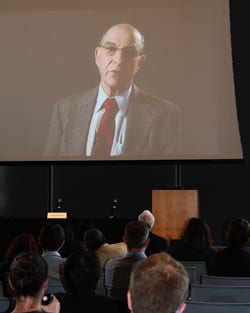Warning that “we are going to see many more Fergusons in this country,” Richard Rothstein, a national expert on education, race and ethnicity, recounts the history of government’s role in racial segregation, in a video created for the Center for Social Development event “Inclusive Housing: A Public Forum for Policy Action in St. Louis.” 
“The black population in this country, African-Americans, cannot succeed so long as it is concentrated in ghettos of the kind that we, all of us, have created in this country,” Rothstein said in his keynote speech Oct. 22 at Washington University in St. Louis’ Brown School.
“Residential segregation is not, as we commonly talk about it, ‘de facto,’ that is, the accident of private prejudice, or white flight from neighborhoods like Ferguson when African-Americans move in, or steering by real estate agents, or people’s choices of wanting to live with others of their own kind,” he said.
All of those are factors, he said. “But our discussion and focus of those factors is our way of avoiding confronting the big issue, which is the fact that the federal, state and local governments have consciously, purposefully, deliberately, with explicit racial intent created segregated metropolitan areas in every metropolitan area of this country.”
Rothstein explains the history of government-sponsored segregation and argues in support of policies to reverse it. He is a research associate of the Economic Policy Institute, the author of books including “Grading Education: Getting Accountability Right,” and from 1999 to 2002 was the national education columnist of the New York Times. His recent work has documented the history of state-sponsored residential segregation, as in his report “The Making of Ferguson.” Understanding segregation’s causes suggests remedies, and practical programs and regulatory strategies can address not only the problems of Ferguson, but also communities nationwide, Rothstein says. He offers these examples:
- Prohibit landlords from refusing to accept tenants whose rent is subsidized.
- Require outer-ring suburbs to repeal zoning ordinances that prohibit construction of housing that lower- and moderate-income residents can afford.
- “Going further,” Rothstein says in his report, “we could require every community to permit development of housing to accommodate its ‘fair share’ of its region’s low-income and minority populations.” He notes that New Jersey has taken a “very modest” step in this direction.
“But we don’t consider such remedies if we remain blind to how Ferguson became Ferguson,” he writes. “It is impractical to think that the public and policymakers will support remedies to problems whose causes they don’t understand.”